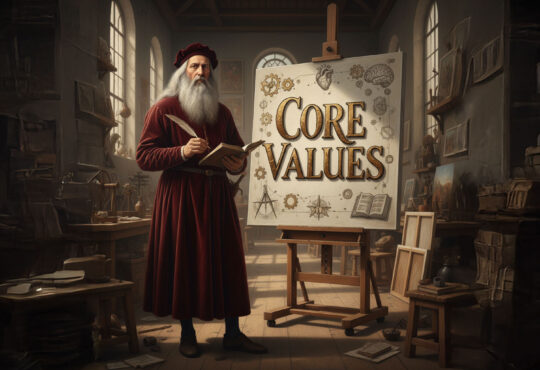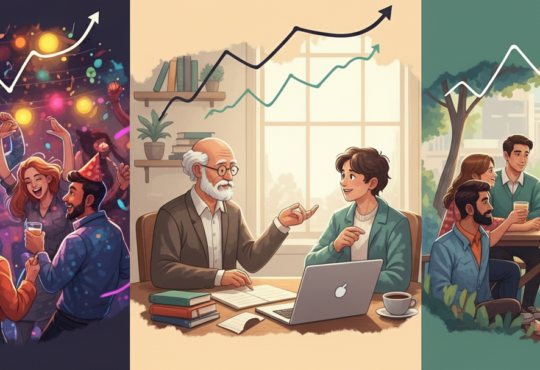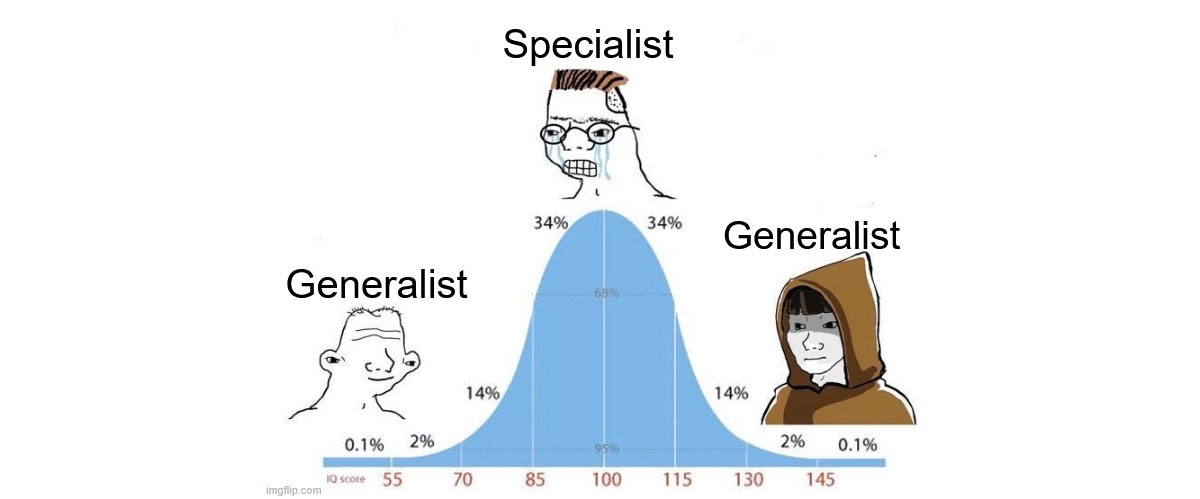
The Only Edge Left in an AI World: Universal Principles
The Problem We Can’t Ignore
We are living in the last age where knowledge, as we traditionally think of it, still has value.
For centuries, what separated one person from another was what they knew. If you could memorize more facts, apply more skills, and manage more systems, you had leverage over those who couldn’t.
But here’s the uncomfortable truth:
AI is eroding that advantage.
Not slowly. Not in decades.
But now.
The white-collar worker who spent years sharpening their analytical skills is already competing with an AI that can run circles around them in seconds. The creative professional who prided themselves on “original thinking” is competing with machines that can generate endless streams of content, code, and design at scale.
And this isn’t just a knowledge worker problem. The timeline for skilled trades is a little longer, but even there, robotics will catch up. The question isn’t if, but when.
So if knowledge as skill is becoming commoditized, what does that mean for the future of work, wealth, and meaning?
The Hidden Fear We Don’t Admit
Think about it.
Are you worried about how to use AI to manage your team better? On a long enough timeline there won’t be a team to manage. Not a human one anyway.
Are you focused on developing highly specialized skills? Being specialist in the AI future will be like owning a conglomerate, but instead of running the company, you’re in the marketing department specializing in marketing or in the IT department specializing in IT.
Imagine AI as a catapult.
You can load it, point it, and fire it.
But if you don’t know the principles of physics (angle, force, resistance) how will you ever hit your target?
That’s the position we’re heading into.
AI will hand us catapults with infinite power.
But without principles, we’ll be firing blindly into the void.
Here’s the real fear: we’ve built our identity, our careers, and our social structures around doing, around skills. And when those skills are automated away, what’s left of us?
The Way Out of the Trap
The solution isn’t to double down on skills.
It’s to step up a layer.
When AI can perform all skills and knows all knowledge, the basic principles of the universe, and the strategies to manipulate them, will be the only knowledge worth knowing.
In other words: universal principles.
The Foundation Beneath All Knowledge
Universal principles are the deep truths that govern how reality works.
They’re not tied to tools, technologies, or industries. They’re timeless. They cut across domains. They let you see what others miss and adapt faster than systems can collapse.
Mental models are the frameworks we use to understand and apply these principles. Mastering them lets you reason clearly, anticipate consequences, and make better decisions across any situation.
Some examples:
- Compounding: Small, repeated inputs over time create exponential outputs.
- Leverage: Using tools, capital, or ideas to multiply your effort.
- Opportunity cost: Every choice comes with a tradeoff.
- Incentives: Behavior follows what is rewarded.
- Entropy: Systems move toward disorder unless energy is added.
Notice something?
These principles don’t age. They were true a thousand years ago. They’re true today. They’ll be true when AI governs entire industries.
Henry Ford didn’t invent the car. What he did was revolutionize manufacturing with the assembly line, applying the principle of process efficiency and standardization. That one principle reshaped the global economy.
Warren Buffett was a brilliant analyst, but that wasn’t the root of his success. What built Berkshire Hathaway into a trillion-dollar empire was his relentless reliance on the principle of compounding, applied through long-term investing.
Ford and Buffett worked in different industries and faced different challenges. But they thrived because they mastered principles, not just tactics.
That’s the playbook for the AI age.
Why Principles Will Outlast AI
Many experts believe that LLMs have limitations and that AGI is not that close. Maybe they’re right. Maybe we won’t be able to just say, “Hey AI, make me money” anytime soon.
But here’s the thing: even if we never reach that sci-fi level of autonomy, the AI we have now, once refined, once integrated, is powerful enough that the need for advanced skills will decline eventually.
You’ll only need principles.
Think about the trajectory of white-collar work. AI is already replacing analysts, writers, designers, and coders. Within three years, it could overtake most skilled white-collar tasks. Ten years out, robotics could eat into skilled trades.
The last “job” worth having?
A principle generalist: someone who understands the world at its deepest level and leverages AI to put that understanding into action.
Because whether we end up in an AI utopia where abundance is unlocked, or an AI dystopia where survival is scarce, the ability to apply universal principles will be the survival skill that matters.
The Clash Between Generalists and Specialists
Let’s make this distinction clear.
A specialist is someone who knows one domain deeply. They’re a surgeon, an accountant, a copywriter, a project manager. Valuable when knowledge is scarce and execution is human. Vulnerable when AI can out-specialize them in seconds.
A universal principles generalist sees across domains. They don’t just know marketing, they understand incentives, psychology, systems, and leverage. They don’t just know finance, they grasp compounding, opportunity cost, and human behavior. However, universal principles aren’t confined to one field: leverage shows up in physics, finance, and negotiation alike. Unlike the traditional white-collar generalist, whose knowledge is narrowing, the principles generalist builds insight that applies anywhere.
In the AI era, being a specialist will be like being a mechanic in a world where engines repair themselves. The engine doesn’t need you. But the generalist, the one who understands principles, can redirect that engine to new frontiers.
What AI Can’t Touch: The Human Role
So where does that leave us, as humans?
It leaves us with what AI can never touch: our core values.
This is where the Three-Layer Model of Human Nature comes in—an idea I derived from the work of Dr. Steven Reiss, who used factor analysis to define 16 categories of human desires, which helps explain the fundamental layers that drive human thought, behavior, and decision-making.
Layer 1: Core Values: States of Being
These are the desires about who we want to be or how we want to exist.
- Curiosity: the desire for knowledge.
- Tranquility: the desire for emotional calm.
- Family: the desire to raise children.
- Power, Honor, Idealism, Romance, etc.
AI cannot replicate these because they are felt experiences. They’re not computations, they’re consciousness.
Layer 2: Core Values: States of Doing
These are the desires about what we want to do.
- Creating
- Competing
- Exploring
- Caretaking
- Organizing
- Analyzing
AI can assist or even overtake many of these (especially analyzing and organizing). But they’re still rooted in values that only humans hold.
Layer 3: Core Cognitive Skills
This is the machinery behind the doing.
- Pattern recognition
- Category formation
- Working memory
- Information processing
This is the layer AI will dominate and is already dominating.
Which means:
- AI displaces us at the cognitive skills level.
- AI eats into many states of doing.
- But states of being remain untouched.
Our role becomes clear: live out our states of being, and use AI as the amplifier to satisfy them.
Curiosity? AI is an infinite research partner.
Tranquility? AI can optimize and automate life’s stressors.
Family? AI can free time and resources to invest in children.
Humans remain the compass. AI becomes the engine.
The Road Ahead
Ryan Ripley from Agile for Humans recently discussed how AI might impact careers in the future. His chart below shows how different work roles such as factory workers, skilled trades, white-collar generalists, and skilled white-collar professionals have shifted in relative prominence since 1950 and how they are projected to evolve through 2050.
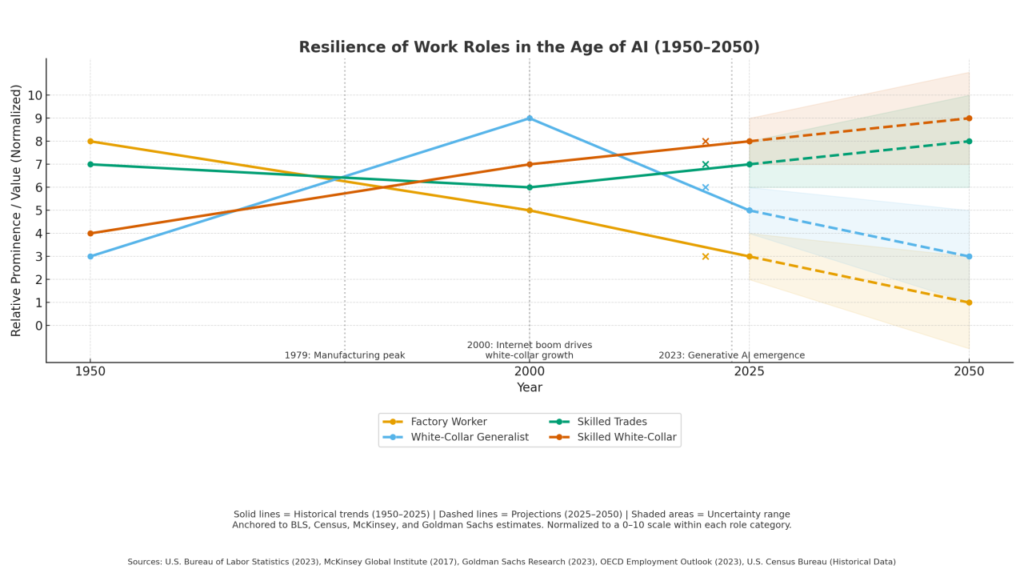
It highlights several key trends:
- Factory Workers peaked in prominence around 1979 but have steadily declined since, with AI expected to further accelerate this drop.
- White-Collar Generalists rose sharply during the internet boom around 2000, but their value is now projected to decrease significantly as generative AI automates routine knowledge work.
- Skilled Trades have remained relatively stable, with only modest shifts, and are expected to retain resilience since many of these roles are harder to automate.
- Skilled White-Collar Professionals have grown consistently and are forecasted to increase even further, as roles requiring deep expertise, creativity, and adaptability are less vulnerable to automation.
In short, the chart suggests that generalist and repetitive work is most at risk from AI, while specialized skills, whether in trades or knowledge work, will hold stronger value in the decades ahead.
Ripley is right: routine generalist work is exposed. Specialists hold value, at least while knowledge is scarce.
The moment AI can out-specialize them in seconds, that advantage disappears. That moment may come sooner than later.
True leverage comes from the universal principles generalist. Not just because they’re adaptable, but because they understand patterns, incentives, and leverage across domains.
AI doesn’t replace them; it multiplies their insight. While specialists will compete with machines eventually, the principles generalist will use AI to play a completely different game.
If this is right, here’s what the curve looks like:
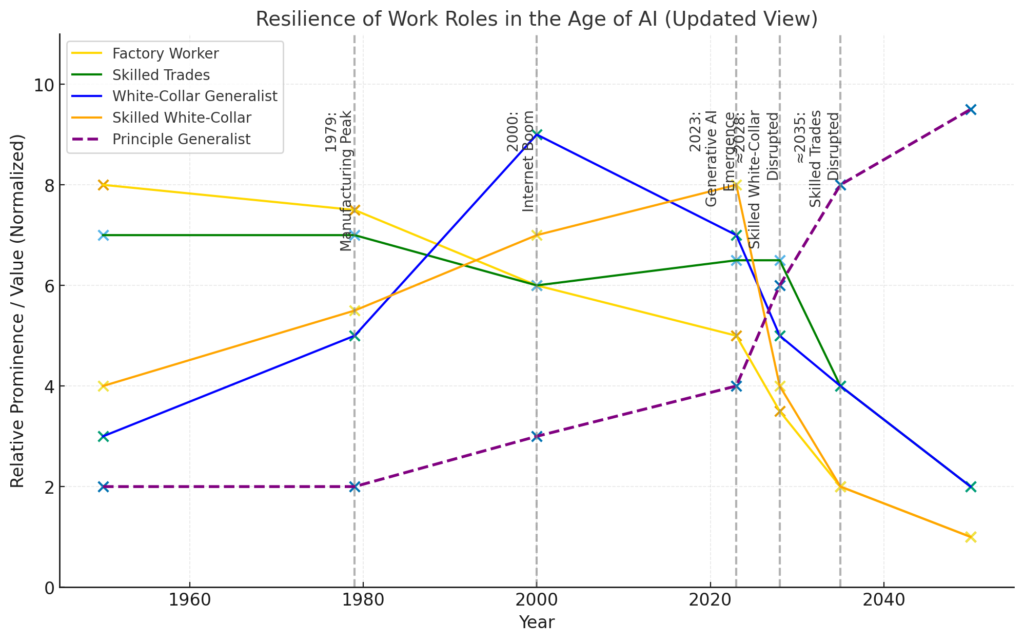
- Skilled White-Collar → sharp decline within 3 years.
- Skilled Trades → hold on longer, decline within 10 years as robotics catches up.
- Factory Workers → continue long decline.
- White-Collar Generalists → peaked around 2000, keep falling.
- Principle Generalists → rise steadily and become dominant by 2050.
That’s the story the chart tells.
And it points to a stark choice:
You can cling to skills that AI will outperform.
Or you can lean into principles that will harness AI.
But here’s the thing: Even if AI never amounts to much, never overtakes the jobs of the specialists, knowing universal principles will help you achieve success no matter what the future holds.
Key Principles
- Knowledge as skill is being commoditized.
If it can be memorized, analyzed, or systematized, AI will do it faster and cheaper. - Universal principles remain timeless.
Compounding, leverage, incentives, and entropy will never go out of style. - Specialists will struggle.
Their advantage erodes as AI out-specializes them. - Generalists will thrive.
Those who see across domains and direct AI accordingly. - Human values are the compass.
AI is the engine, but states of being (e.g. curiosity, tranquility, family) guide its direction.
Key Takeaways
- The age of knowledge as power is ending.
- AI displaces humans at the level of cognitive skills.
- States of being and doing remain human, but must be understood in light of AI.
- Universal principles become the ultimate leverage in a world where execution is automated.
- Whether the future is utopia or dystopia, those who master principles will not just survive, they’ll thrive.
Final Thought:
You don’t need to compete with AI. You need to partner with it.
And the only way to do that is to understand the principles that govern the game.
Because when the machines know everything, the only knowledge worth knowing will be the timeless laws of reality, and how to use them.
If you found these ideas valuable, I write a weekly newsletter where I dive deeper into universal principles, mental models, and strategies for thriving in an AI-driven world. If you’re not already subscribed, you can get these insights delivered straight to your inbox.
Thanks for reading my stuff,
MJ

